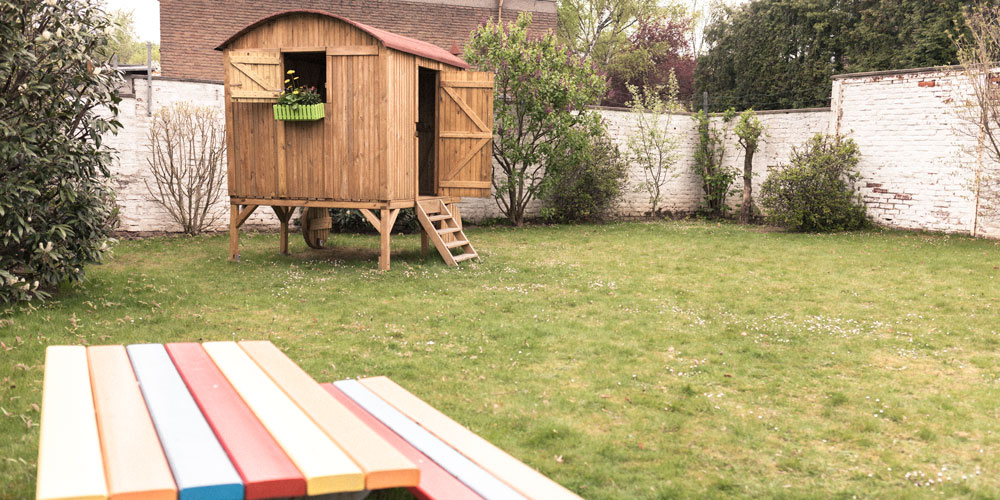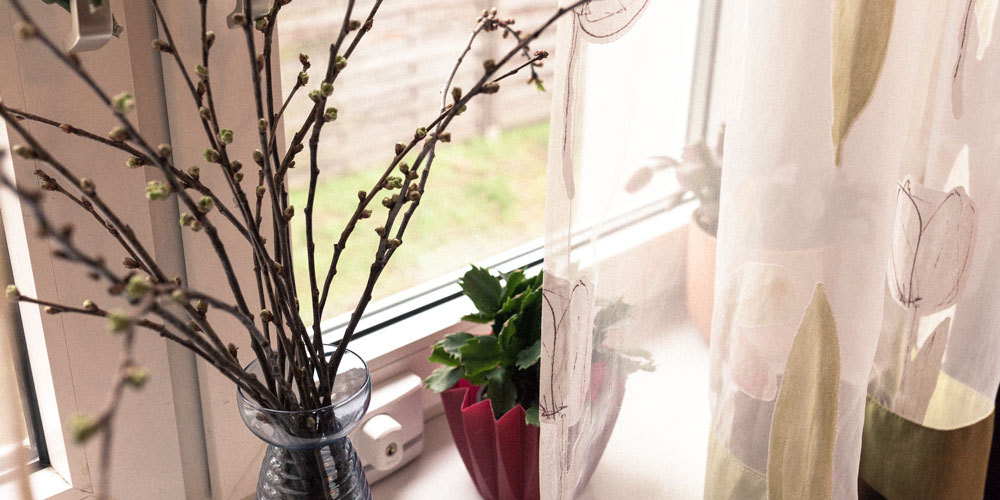History
»There is nothing good unless you do it!« – The women’s group that met to talk in Ursula Arnold’s living room took Erich Kästner’s bon mot literally. In the mid ‘70s the women didn’t only want to theoretically discuss the issues of equality (enshrined in the Constitution since 1949 but certainly not practised in everyday life) and violence within the family which had been taboo for far too long. They wanted to provide practical help for living. Little money, great idealism! And when the need is acute, a couch in someone’s home can be an initial lifeline. Ursula Arnold’s home sheltered many woman fleeing from her husband’s blows and humiliations, and her children.
It quickly became clear, however, that staying overnight on her couch could not be the lasting solution to this social problem. The first women’s houses had already opened in Berlin and Cologne, following the UK example. Ursula Arnold maintained a good relationship with the city’s Free Democrat (FDP) and Social Democrat (SDP) female councillors. She knew that it was essential to set up an association in order to raise funds. The entity ›Frauen helfen Frauen e. V.‹ was born, and just six months later in summer 1977 a small house beside Grafenberg Forest, rented from the City of Düsseldorf, was available to provide shelter to abused women. After Cologne and Bielefeld, it was the third women’s house in North Rhine-Westphalia.

The exact address was kept secret but the telephone number – for first contact with the police, social services and doctors – was publicised on trains and in hospitals. Hardly had the number been released, the house was already full thanks to word-of-mouth propaganda. The space for ten women was quickly exhausted, and the house’s location beside the forest was hard to protect.
The association started looking for a new house, finally moving in 1979 to an apartment building provided cheaply by the city’s housing authority, which could shelter a maximum of 40 people. At the time, demand was so great that the countless mattresses for the women and their children had to be propped up against the walls during the day, and the employees only had a tiny office. Given this situation, it was obviously difficult to offer professional and follow-up help over and above initial emergency accommodation. Many women returned to their old relationships. This was not what the association was trying to achieve with its work.
While initially there were only volunteers – housewives, working people and students – from 1978 the state of NRW funded a social worker who was joined a year later by a housekeeping employee, in 1988 by an educator for the children and, almost twenty years after the Frauenhaus was founded, by a second social education worker. The City helped to secure the Frauenhaus’s existence with a fixed allocation from its budget. However, the association has to raise additional donations of at lest 35,000 euros – no small matter!
Gisela Timpe-Rottwilm – now the First Chairwoman of the association which has around 100 members – recalls the »catastrophic« beginnings. »At the time we were funded by per diem allowances per woman and per child. This gave rise to an absurd situation: the fuller the house became, the better off we were…« She herself initially started off as a volunteer dealing with office work. »When it came to financial negotiations, it helped that I wasn’t one of that group wearing lilac dungarees,« says the former executive secretary, looking back on the effect of her then rather conservative style of dressing. Ultimately, she was able to achieve a part-time position as the managing director in 1992. Since this job was created 25 years ago, the scope of her duties has significantly increased. Multi-tasking is essential: the managing director is the link between the executive board and the staff; she sets the tone, creates the mood that should prevail in the house, and has an open, empathetic ear for the women. In addition to time-consuming communication in every direction, there is also bookkeeping, personnel management, fundraising, appointments, team meetings, work reports, attending to the members …

The need for the Frauenhaus has long been beyond question. Four decades after its foundation, the sad reality is that around 25,000 violent assaults are reported per year in NRW. The real figure is probably far higher.
The Frauenhaus in Düsseldorf that has been run autonomously for 40 years has sheltered more than 4,000 women and just as many children, advised them, accompanied them to the authorities, provided them with contacts within the network, and supported them on their way to violence-free self-determination. »The Frauenhaus as a springboard to another life« is how Gisela Timpe-Rottwilm describes it.
In the meantime, 80–90 per cent of those seeking protection have a migrant background; most of the largely young women with small children come from Turkey, Morocco and Eastern Europe. They are trapped in complex problem situations, are not aware of their legal rights, and have a greater need for »follow-up counselling«. The Frauenhaus recently started offering German classes once a week on request, in order to minimise communication problems within the house itself, and to help when dealing with formalities and the authorities. Former residents also step in and help out as translators.
The atmosphere in the Frauenhaus is cheerful and friendly, even when the weather is damp and dreary outside. It is like a big family home with a spacious kitchen, recreation room and dining room. There are 17 beds in the six bedrooms. Two particularly attractive features are the brightly colourful children’s house with many stimulating games and toys, and a garden in which residents can relax. It is the staff, however, who form the heart of the Frauenhaus. Their professional expertise, solidarity, dedication and resilience are what makes this house so strong.
It is a great affirmation of the Frauenhaus’s work that most of the women who have stayed here have meanwhile found a good way of shaping their new lives for themselves and their children.
